【弯道超车】Unit 3 Make it happen! 核心语法之情态动词-2025年外研版(2024)新八年级英语上册精讲精练 (含答案解析)
文档属性
| 名称 | 【弯道超车】Unit 3 Make it happen! 核心语法之情态动词-2025年外研版(2024)新八年级英语上册精讲精练 (含答案解析) | 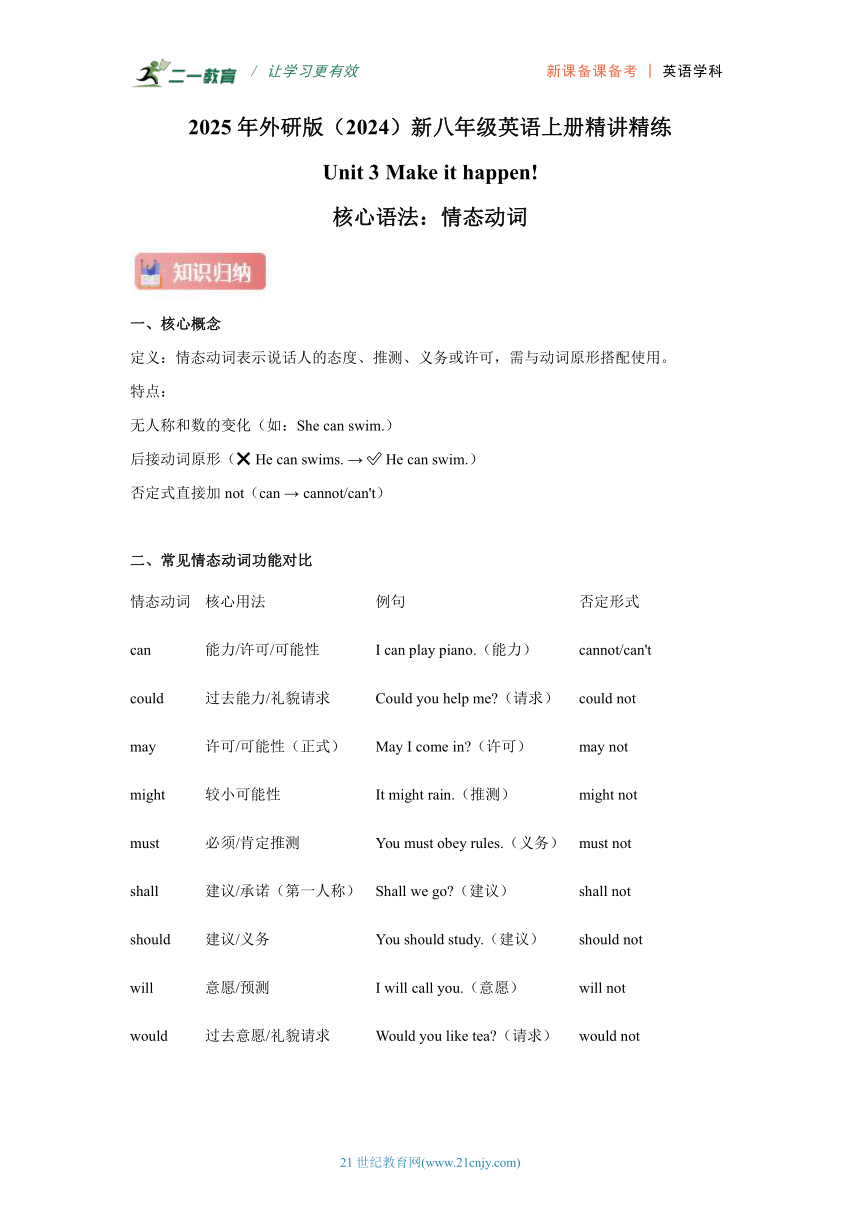 | |
| 格式 | docx | ||
| 文件大小 | 68.3KB | ||
| 资源类型 | 试卷 | ||
| 版本资源 | 外研版 | ||
| 科目 | 英语 | ||
| 更新时间 | 2025-07-10 12:13:06 | ||
图片预览

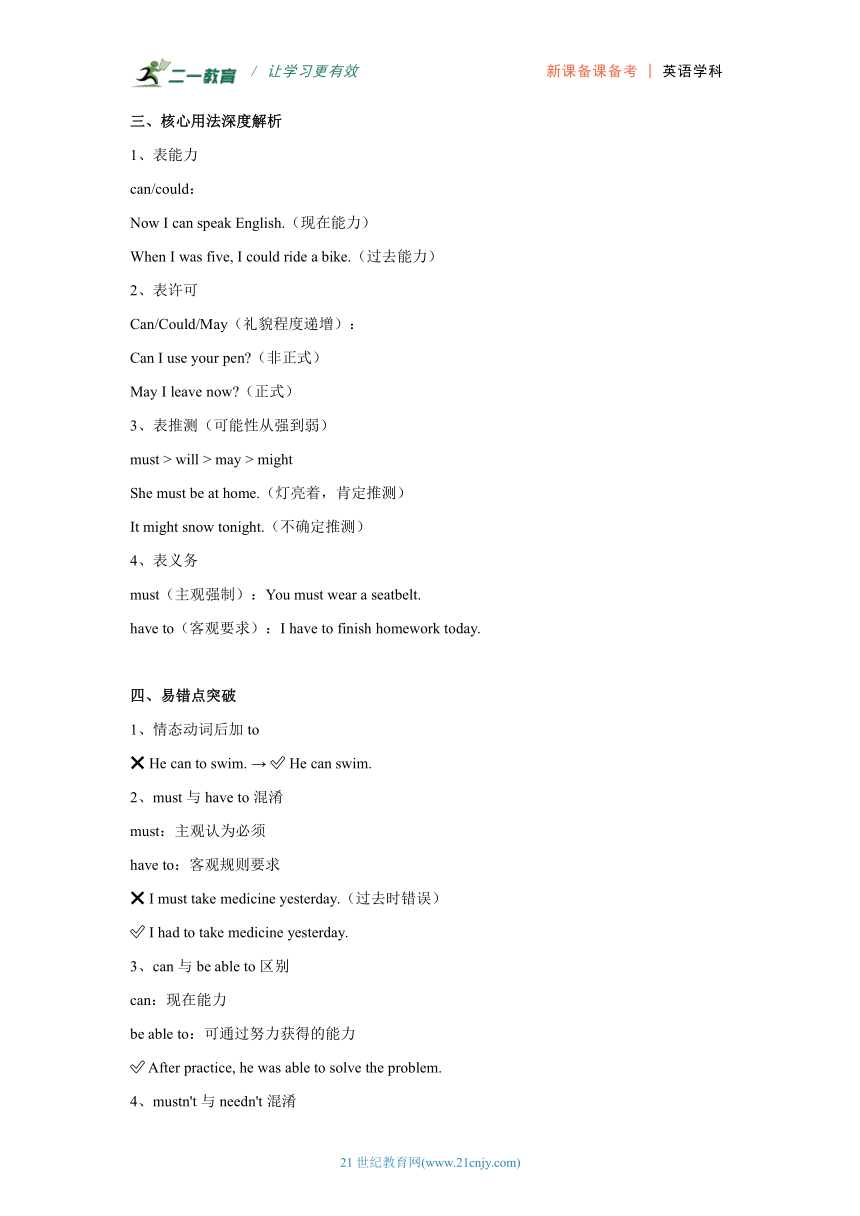
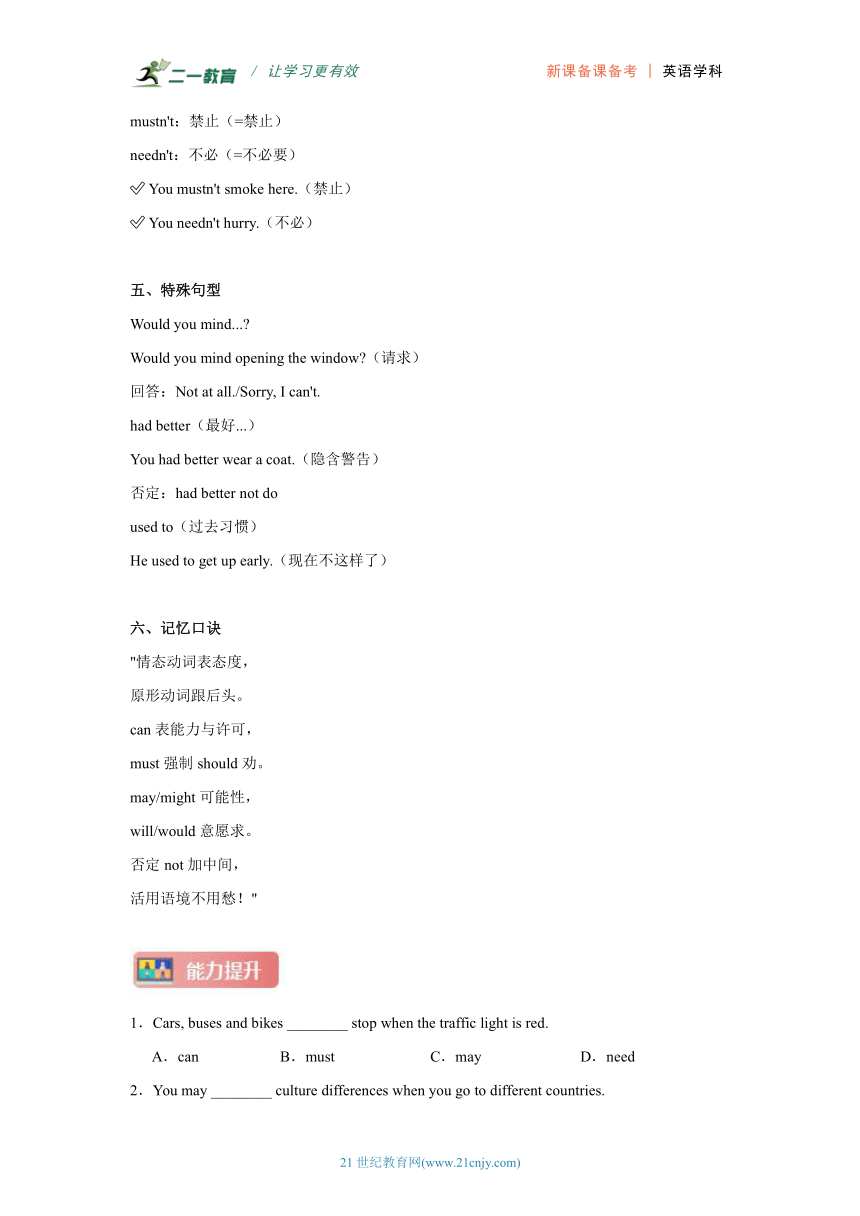
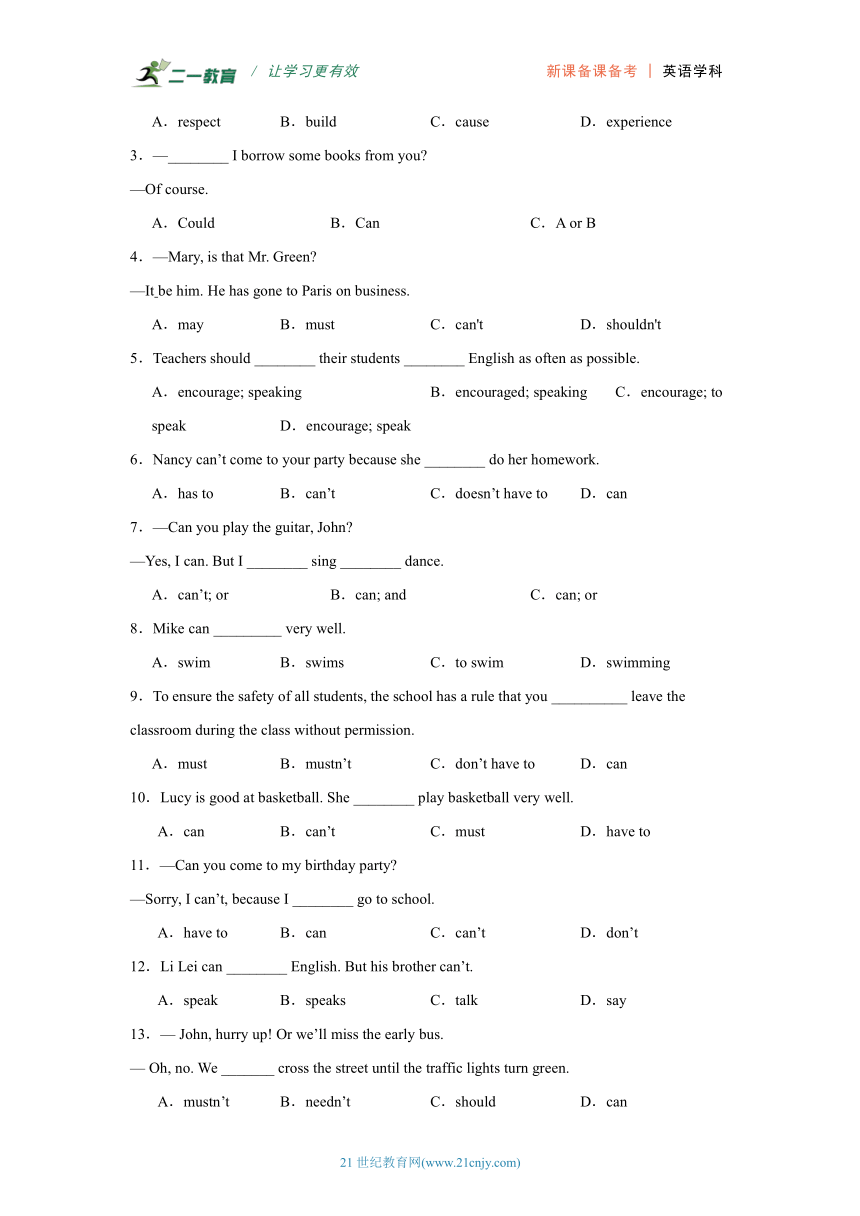
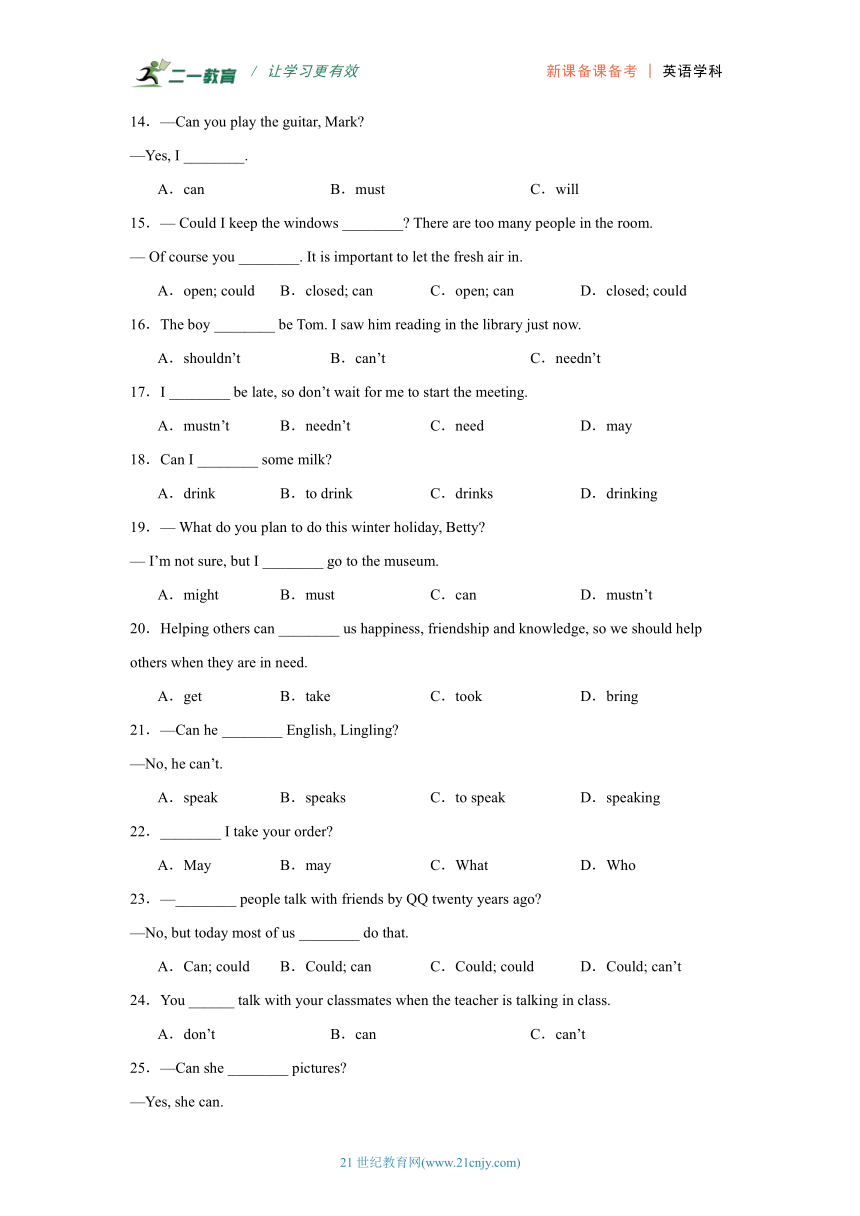
文档简介
/ 让学习更有效 新课备课备考 | 英语学科
/ 让学习更有效 新课备课备考 | 英语学科
2025年外研版(2024)新八年级英语上册精讲精练
Unit 3 Make it happen!
核心语法:情态动词
一、核心概念
定义:情态动词表示说话人的态度、推测、义务或许可,需与动词原形搭配使用。
特点:
无人称和数的变化(如:She can swim.)
后接动词原形( He can swims. → He can swim.)
否定式直接加not(can → cannot/can't)
二、常见情态动词功能对比
情态动词 核心用法 例句 否定形式
can 能力/许可/可能性 I can play piano.(能力) cannot/can't
could 过去能力/礼貌请求 Could you help me (请求) could not
may 许可/可能性(正式) May I come in (许可) may not
might 较小可能性 It might rain.(推测) might not
must 必须/肯定推测 You must obey rules.(义务) must not
shall 建议/承诺(第一人称) Shall we go (建议) shall not
should 建议/义务 You should study.(建议) should not
will 意愿/预测 I will call you.(意愿) will not
would 过去意愿/礼貌请求 Would you like tea (请求) would not
三、核心用法深度解析
1、表能力
can/could:
Now I can speak English.(现在能力)
When I was five, I could ride a bike.(过去能力)
2、表许可
Can/Could/May(礼貌程度递增):
Can I use your pen (非正式)
May I leave now (正式)
3、表推测(可能性从强到弱)
must > will > may > might
She must be at home.(灯亮着,肯定推测)
It might snow tonight.(不确定推测)
4、表义务
must(主观强制):You must wear a seatbelt.
have to(客观要求):I have to finish homework today.
四、易错点突破
1、情态动词后加to
He can to swim. → He can swim.
2、must与have to混淆
must:主观认为必须
have to:客观规则要求
I must take medicine yesterday.(过去时错误)
I had to take medicine yesterday.
3、can与be able to区别
can:现在能力
be able to:可通过努力获得的能力
After practice, he was able to solve the problem.
4、mustn't与needn't混淆
mustn't:禁止(=禁止)
needn't:不必(=不必要)
You mustn't smoke here.(禁止)
You needn't hurry.(不必)
五、特殊句型
Would you mind...
Would you mind opening the window (请求)
回答:Not at all./Sorry, I can't.
had better(最好...)
You had better wear a coat.(隐含警告)
否定:had better not do
used to(过去习惯)
He used to get up early.(现在不这样了)
六、记忆口诀
"情态动词表态度,
原形动词跟后头。
can表能力与许可,
must强制should劝。
may/might可能性,
will/would意愿求。
否定not加中间,
活用语境不用愁!"
1.Cars, buses and bikes ________ stop when the traffic light is red.
A.can B.must C.may D.need
2.You may ________ culture differences when you go to different countries.
A.respect B.build C.cause D.experience
3.—________ I borrow some books from you
—Of course.
A.Could B.Can C.A or B
4.—Mary, is that Mr. Green
—It be him. He has gone to Paris on business.
A.may B.must C.can't D.shouldn't
5.Teachers should ________ their students ________ English as often as possible.
A.encourage; speaking B.encouraged; speaking C.encourage; to speak D.encourage; speak
6.Nancy can’t come to your party because she ________ do her homework.
A.has to B.can’t C.doesn’t have to D.can
7.—Can you play the guitar, John
—Yes, I can. But I ________ sing ________ dance.
A.can’t; or B.can; and C.can; or
8.Mike can _________ very well.
A.swim B.swims C.to swim D.swimming
9.To ensure the safety of all students, the school has a rule that you __________ leave the classroom during the class without permission.
A.must B.mustn’t C.don’t have to D.can
10.Lucy is good at basketball. She ________ play basketball very well.
A.can B.can’t C.must D.have to
11.—Can you come to my birthday party
—Sorry, I can’t, because I ________ go to school.
A.have to B.can C.can’t D.don’t
12.Li Lei can ________ English. But his brother can’t.
A.speak B.speaks C.talk D.say
13.— John, hurry up! Or we’ll miss the early bus.
— Oh, no. We _______ cross the street until the traffic lights turn green.
A.mustn’t B.needn’t C.should D.can
14.—Can you play the guitar, Mark
—Yes, I ________.
A.can B.must C.will
15.— Could I keep the windows ________ There are too many people in the room.
— Of course you ________. It is important to let the fresh air in.
A.open; could B.closed; can C.open; can D.closed; could
16.The boy ________ be Tom. I saw him reading in the library just now.
A.shouldn’t B.can’t C.needn’t
17.I ________ be late, so don’t wait for me to start the meeting.
A.mustn’t B.needn’t C.need D.may
18.Can I ________ some milk
A.drink B.to drink C.drinks D.drinking
19.— What do you plan to do this winter holiday, Betty
— I’m not sure, but I ________ go to the museum.
A.might B.must C.can D.mustn’t
20.Helping others can ________ us happiness, friendship and knowledge, so we should help others when they are in need.
A.get B.take C.took D.bring
21.—Can he ________ English, Lingling
—No, he can’t.
A.speak B.speaks C.to speak D.speaking
22.________ I take your order
A.May B.may C.What D.Who
23.—________ people talk with friends by QQ twenty years ago
—No, but today most of us ________ do that.
A.Can; could B.Could; can C.Could; could D.Could; can’t
24.You ______ talk with your classmates when the teacher is talking in class.
A.don’t B.can C.can’t
25.—Can she ________ pictures
—Yes, she can.
A.draw B.draws C.drawing D.to draw
26.More and more people can ________ 100 years old in the future.
A.live B.live to be C.living to be D.lived to be
27.—I’ve got a toothache, Mum.
—Oh, you ________ eat too many sweet snacks.
A.shouldn’t B.needn’t C.should D.need
28.You ________ play football in the classroom. It's a rule.
A.can B.can't C.doesn't D.aren't
29.—Could I have a look at your picture
—Yes, of course you ________.
A.should B.can
C.will D.might
30.—May I take my pet dog with me into the cinema
—The rule says no. So you __________.
A.can B.mustn’t C.may D.should
31.We ________ pollute the river, or we’ll be punished.
A.don’t B.didn’t C.mustn’t D.may not
32.You ________ be quiet in the library.
A.can B.must C.may
33.—Will the famous designer come to the fashion show next Monday
—I’m not sure. She ________ not come.
A.must B.may C.can D.should
34.Children ________ be very careful when they go across the busy street.
A.shouldn’t B.may C.must D.can’t
35.—Wow! You are cool!
—I ________ wear my school uniform, but it’s washed and it’s still wet.
A.should B.can C.may D.will
36.—Some people don’t show their talents (天赋) at the very beginning.
—Exactly. Even Einstein _________ speak until he was three.
A.mustn’t B.can’t C.couldn’t D.needn’t
37.You should________it carefully before________ a composition.
A.consider; write B.consider; writing C.considering; writing D.considering; write
38.You ________ finish your homework before you watch TV.
A.must B.can C.may
39.He has to ________ his bed every morning.
A.makes B.make C.making
40.Playing soccer can ________.
A.make we strong B.make me strong C.makes me strong D.makes we strong
41.Helen wants to join the ________ club because she can ________ well.
A.dance; dance B.dancing; dances
C.dance; dances D.dancing; dance
42.—Where is Jane —________ in her office.
A.She maybe B.She is maybe C.She maybe is D.May be she is
43.________ stay at home all day.
A.Why don’t B.How about C.I’d like D.You’d better
44.You had better ________ rubbish around. It’s so dirty.
A.not to throw B.not throw C.to not throw D.throw
45.—Sir, could I touch the goldfish in the tank
—Sorry, I am afraid you ________.
A.can’t B.shouldn’t C.needn’t D.couldn’t
46.—What are the rules at your school
—We ______ eat in the classroom.
A.don’t B.can’t C.aren’t D.doesn’t
47.—Must I return the book today
—No, you ________. You can return it tomorrow.
A.mustn’t B.can’t C.needn’t D.shouldn’t
48.I think your lost pen ________ on the sofa in your home.
A.may be left B.should not be left
C.may leave D.should not leave
49.You’d better take ________ umbrella with you, Peter. There ________ some rain in the late afternoon.
A.an; may be B.an; maybe C.a; maybe have D.a; may have
50.We ________ eat in the classroom, because it’s not allowed.
A.can B.can’t C.must D.mustn’t
51.—___________ I borrow the books from the library, Miss Yang
—Sorry, you __________. These books are only for members of the English Club.
A.Can; shouldn’t B.May; can’t C.Could; couldn’t D.Can; needn’t
52.You'd better __________ hard from now on, __________ you will fail the exam.
A.work; and B.working; or C.working; and D.work; or
53.—I saw John in the park this morning.
—It ________ be him. He is in Hong Kong.
A.can’t B.can C.mustn’t D.must
54.—Could I invite my friends to the party on Saturday, Mom
—Of course you ________. That sounds like fun.
A.may B.could C.must D.can
55.Look at the young lady in red. It be Mary. She always likes wearing a red coat.
A.can B.may C.must D.can′t
56.We ________ hunt wild animals. It’s against the law.
A.can B.may C.mustn’t D.needn’t
57.Don’t give up. Life _________ be perfect all the time.
A.mustn’t B.can’t C.needn’t D.shouldn’t
58.—He ________ in public.
—Oh, he is a shy boy.
A.dare not speak B.dare not to speak
C.dare not speaking D.doesn’t dare speak
59.The elephant ________ swim, but the koala ________.
A.can; can’t B.can’t; can C.can; can D.can’t; can’t
60.—What’s wrong with you You look so tired.
—Last night I ________ sleep well.
A.couldn’t B.wouldn’t C.mustn’t D.needn’t
61.— Bill, ________ I use your ruler
— Of course you can. Here you are.
A.can B.must C.need D.should
62.—Jack, could you please ________ the door I have a cold.
—Of course.
A.to close B.closed
C.close D.closing
63.The girl is often in a white coat. She ______ like white very much.
A.must B.can C.would D.will
64.—What can we do for the left-behind children in the village
—We ________ help them with their study online at weekends.
A.must B.can’t C.need D.could
65.—What is Susan doing
—She soup. She can very good soup.
A.is making; make B.make; make C.is making; is making D.makes; make
66.In the library, it is expected that you __________ keep your voice down to avoid disturbing others.
A.must B.mustn’t C.don’t have to D.can
67.—Could I _________ your bike
—Sorry, I _________ it to Mary.
A.lent;borrow B.borrow;lent C.lend;borrowed D.lent;borrowed
68.—________ I pour the waste water into the river
—No, you mustn’t.
A.Must B.May C.Need D.Should
69.Sam hates rice dumplings. He would rather ________ some pizza.
A.to have B.have C.has D.having
70.You can watch TV, but you ________ clean your room first.
A.can B.may C.have to D.must have to
71.The boy is only five years old, but he can play golf well.(与划线部分意义相同的是?)
A.able B.is able C.be able to D.is able to
72.What do you think can ________ more customers to our store
A.attraction B.attractive C.attract D.attractively
73.—Do you feel like ________ or shall we go by bus
—I prefer to walk, but we have to ________ a taxi, for time is short.
A.walking; take B.to walk; take C.walking; taken D.to walk; took
74.—You ________ fight with your classmates. That makes the teachers really unhappy.
—________ .
A.can't; Sorry, I won't B.can't; OK, I will C.can; Oh, I won't D.can; I see
75.— Why did you give up _________, Mr. Green
— Because it may _________ lung cancer.
A.smoking; force B.smoke; cause C.smoking; cause
76.—Could you please ________ me your notebook, Grace
—Certainly. Here you are.
A.borrow B.to borrow C.lend D.to lend
77.Tim suggested his friend Mary _________ because she was so fat.
A.be on diet B.goes on a diet C.go on a diet D.to be on a diet
78.We _______ jump the queue. It’s not polite.
A.may not B.mustn’t C.can’t D.shouldn’t
79.—_________ I swim here
—I’m sorry. Children _________ swim alone here. It’s very dangerous.
A.Must; can’t B.May; shouldn’t
C.Can; mustn’t D.Can; needn’t
80.To give your brain a rest, you may ________ down on your bed, ________ yourself in a comfortable position without thinking about anything.
A.lie; laying B.lay; lying C.lie; lying D.lay; laying
/ 让学习更有效 新课备课备考 | 英语学科
/ 让学习更有效 新课备课备考 | 英语学科
21世纪教育网(www.21cnjy.com)
21世纪教育网(www.21cnjy.com)
参考答案及试题解析
1.B
【解析】句意:当交通灯是红色时,小汽车、公共汽车和自行车必须停下来。
考查情态动词。can可能;must一定,必须;may可以;need需要。 根据空格后“when the traffic light is red.”可知,当交通灯是红色的时候,小汽车, 公共汽车和自行车必须停下来。故选B。
2.D
【解析】句意:当你去不同的国家时,你可能会经历文化差异。
考查动词辨析。respect尊重;build建造;cause引起;experience经历。根据“culture differences”可知,此处表示“经历文化差异”,用experience符合语境。故选D。
3.C
【解析】句意:——我可以向你借几本书吗?——当然。
考查情态动词。could能;can能。根据题干可知,此处是表示请求允许,用could和can都可以,故选C。
4.C
【解析】句意:——玛丽,那是格林先生吗?——不可能是他。他已经去巴黎出差了。
考查情态动词。may也许、可以 ;must必须 ;can't不可能,表否定猜测 ;shouldn't不该;根据下文“ He has gone to Paris on business”可知此处指“不可能是格林先生”。故选C。
5.C
【解析】句意:教师应该鼓励学生尽可能多的说英语。
考查情态动词及encourage的用法。空前should是情态动词,可推测出此处是动词原形;排除B;encourage sb to do sth表示“鼓励某人做某事”,所以第二空是缺动词不定式,故选C。
6.A
【解析】句意:南希不能参加你的派对,因为她必须要做她的家庭作业。
考查情态动词辨析。has to不得不,必须;can’t不能;doesn’t have to不必;can能够。根据句中“can’t come to your party”可知,因为南希必须做她的家庭作业,所以她不能参加你的聚会,此处使用has to。故选A。
7.A
【解析】句意:——约翰,你会弹吉他吗?——是的,我能。但是我不会唱歌也不会跳舞。
考查情态动词和连词辨析。can能够;can’t不能够;or或者;and和。根据“But”可知,此处表示转折,表示我“不会”唱歌,因此第一空用can’t;本句是否定句,表并列用or。故选A。
8.A
【解析】句意:Mike游泳游得很好。
考查情态动词后接动词原形的用法。can是情态动词,后接动词原形,故选A。
9.B
【解析】句意:为了确保所有学生的安全,学校有一条规定,上课期间未经允许,你不得离开教室。
考查情态动词。must必须;mustn’t禁止,不允许;don’t have to不必;can可以。根据“To ensure the safety of all students”及“without permission”可知,上课期间未经允许,禁止离开教室,mustn’t符合语境。故选B。
10.A
【解析】句意:露西擅长打篮球。她能打篮球打得很好。
考查情态动词。can能;can’t不能;must必须;have to不得不 。根据“Lucy is good at basketball.”可推断,她篮球能打得很好。故选A。
11.A
【解析】句意:——你能来参加我的生日聚会吗?——对不起,我不能去,因为我得去上学。
考查动词词义辨析。have to不得不;can能够;can’t不能够;don’t表示否定,等于do not。根据“Sorry, I can’t”可知,此处表示对不起,我“不得不”去上学。故选A。
12.A
【解析】句意:李雷会说英语。但他哥哥不行。
考查动词的辨析。speak说,说某种语言;talk交谈;say说的内容;can“能”,是情态动词,后加动词原形,speak English“说英语”,故选A。
13.A
【解析】句意:——约翰,快点!否则我们就赶不上早班车了。——哦,不。在交通灯变绿之前,我们不能过马路。
考查情态动词。mustn’t禁止,一定不要;needn’t不必;should应该;can能,会;根据“cross the street until the traffic lights turn green.”可知,此处指的是“禁止过马路直到绿灯变亮”,故选A。
14.A
【解析】句意:——你会弹吉他吗,马克?——是的,我会。
考查情态动词。can会;must必须;will将会。can开头的一般疑问句,肯定回答用“Yes, 主语+can”。故选A。
15.C
【解析】句意:——我可以把窗户开着吗?房间里人太多了。——当然可以。让新鲜空气进来很重要。
考查形容词作宾补和情态动词。open开着的;closed关着的;can能,可以;could是can的过去式。根据句意“It is important to let the fresh air in”可知,这里是让窗户开着,排除B和D;could用来表示语气委婉,答语中用can。故选C。
16.B
【解析】句意:这个男孩不可能是汤姆。 刚才我看见他在图书馆看书。
考查动词辨析。shouldn’t不应该;can’t不能;needn’t不必要。根据“ I saw him reading in the library just now.”可知,此处是指不可能是汤姆。故选B。
17.D
【解析】句意:我可能要迟到了,因此开始开会吧,不要等我。
考查情态动词。mustn’t禁止;needn’t没必要;need需要;may可能。根据“so don’t wait for me to start the meeting”可知此处表示不确定推测,用may表示“可能”。故选D。
18.A
【解析】句意:我可以喝一些牛奶吗?
考查一般疑问句。本句是情态动词can引导的一般疑问句,句中谓语动词用其原形。故选A。
19.A
【解析】句意:——贝蒂,这个寒假你打算做什么?——我不确定,但是我可能去博物馆。
考查情态动词。might可能;must必须;can能;mustn’t禁止。根据“I’m not sure”可知,空处表示不确定推测,所以用might,故选A。
20.D
【解析】句意:帮助别人可以给我们带来快乐、友谊和知识,所以我们应该在别人需要帮助的时候帮助他们。
考查动词辨析。get得到;take带走;took带走,take的过去式;bring带来。情态动词can后接动词原形,排除C项;根据“Helping others can…us happiness, friendship and knowledge”可知,帮助他人能带来快乐、友谊和知识,bring sb sth“给某人带来某物”。故选D。
21.A
【解析】句意:——他会说英语吗,玲玲?——不,他不会。
考查情态动词的用法。情态动词can后加动词原形。故选A。
22.A
【解析】句意:您现在点菜吗?
考查情态动词用法。May情态动词,表示请求,许可,首字母大写,位于句首;may位于句中;What什么;Who谁。根据“...I take your order ”可知,此处用“May”,这句话通常用于餐厅,服务员询问顾客是否要点菜。故选A。
23.B
【解析】句意:——二十年前人们可以通过QQ和朋友聊天吗?——不能,但今天我们大多数人都能做到。
考查情态动词。can能;could能,can的过去式;can’t不能。根据第一个空空后的“twenty years ago”可知,句子时态为一般过去时,此处应用动词的过去式形式;根据第二个空空前的“today”可知,句子时态为一般现在时;根据空前的“but”可知,此处句意发生了转折,表示但今天我们大多数人都能做到。故选B。
24.C
【解析】句意:当老师在课堂上讲话的时候,你不可以和你的同学交谈。
考查情态动词。don’t不要;can能;can’t不能。根据“You…talk with your classmates when the teacher is talking in class.”可知,此处表示老师讲话时学生不能和同学交谈,can’t表示“不能”,情态动词,符合语境。故选C。
25.A
【解析】句意:——她会画画吗?——是的,她会。
考查情态动词。根据空前的情态动词“Can”可知,此处用动词原形。故选A。
26.B
【解析】句意:在未来越来越多的人能活到100岁。
考查动词短语。live居住,生活;live to be活到。根据“100 years old ”可知此处指“能活到100岁”,所以排除A;情态动词can后接动词原形。故选B。
27.A
【解析】句意:——我牙痛,妈妈。——哦,你不应该吃太多甜食。
考查情态动词。shouldn’t不应该;needn’t不必;should应该;need需要。根据“I’ve got a toothache, Mum.”可知吃太多甜食引发了牙痛,不应该吃太多。故选A。
28.B
【解析】句意:你不能在教室里踢足球。这是一个规则。
考查情态动词、be动词和助动词。can能够;can't不能够;doesn't不;aren't不是。句子是一般现在时,主语you是第二人称,否定句借助于助动词don't,排除C选项。play是动词原形,不与系动词一起连用,排除D选项。根据“play football in the classroom”,可知,不可以在教室里踢足球,故选B。
29.B
【解析】句意:——我能看一看你的照片吗?——是的,你当然可以。
考查情态动词。should应该;can能;will将;might可以。根据“Yes”可知此处是同意对方;问句中的Could表示语气委婉,肯定回答要用can。故选B。
30.B
【解析】句意:——我可以带我的宠物狗去电影院吗?——规则说不行,所以你不能。
考查情态动词。can能够;mustn’t禁止,不准;may可以;should应该。根据“The rule says no”可知不能带宠物狗去电影院,应用mustn’t。故选B。
31.C
【解析】句意:我们千万不要污染河流,否则,会受到惩罚的。
考查动词辨析。don’t不要;didn’t不要;mustn’t禁止;may not可能不会。根据“we’ll be punished.”可知,此处表示禁止做,所以C项符合。故选C。
32.B
【解析】句意:你必须在图书馆保持安静。
考查情态动词辨析。can可以,能够;must必须;may可以。根据常识可知,在图书馆必须保持安静。故选B。
33.B
【解析】句意:——这位著名的设计师下周一会来参加时装表演吗?——我不确定。她可能不会来。
考查情态动词。must一定;may可能;can能够;should应该。根据“I’m not sure”可知不确定,说明她可能不会来,故选B。
34.C
【解析】句意:孩子们穿过繁忙的街道时必须非常小心。
考查情态动词。shouldn’t不应该;may可能;must必须;can’t不能。根据常识可知,儿童过马路必须小心,故选C。
35.A
【解析】句意:——哇!你好酷!——我应该穿校服的,但是它洗了还是湿的。
考查情态动词辨析。should应该;can能够;may也许;will将要。根据“wear my school uniform, but it’s washed and it’s still wet.”可知,在学校应该穿校服。故选A。
36.C
【解析】句意:——一些人在最初的时候没有展示出他们的天赋。——正是如此。甚至爱因斯坦也是直到3岁才会说话。
考查情态动词辨析。mustn’t禁止;can’t表示现在不能;couldn’t表示过去不能;needn’t不必。根据“Even Einstein…speak until he was three.”可知,此处指的是他三岁的时候不会说话,用过去式couldn’t,故选C。
37.B
【解析】句意:在写作文之前,你应该仔细考虑它。
考查情态动词和介词用法。should是情态动词,后加动词原形;before意为“在……之前”,是介词,后加动名词作宾语,故选B。
38.A
【解析】句意:在看电视之前,你必须先完成作业。
考查情态动词。must必须;can能;may可能。根据“finish your homework before you watch TV.”可知在看电视之前,必须先完成作业。故选A。
39.B
【解析】句意:他每天早上必须整理床铺。
考查情态动词的用法。情态动词have to后接动词原形。故选B。
40.B
【解析】句意:踢足球可以使我强壮。
考查情态动词和人称代词的用法。根据“Playing soccer can ...”可知,can为情态动词,后接动词原形,排除CD项;再根据make为动词,后接代词要用宾格形式,排除A项。故选B。
41.D
【解析】句意:——海伦想加入舞蹈俱乐部,因为她跳舞跳得很好。
考查动词用法。dancing club“舞蹈俱乐部”,动名词作定语,第一空选填dancing;第二空位于情态动词后,用动词原形dance。故选D。
42.B
【解析】句意:——简在哪里?——她可能在办公室。
考查maybe在句中的位置以及maybe/may be的区别。maybe和may be都有“也许”之意,maybe是副词,may be是“情态动词+be动词”结构,通常在句中作谓语。选项A缺少谓语动词,选项D中的be和is重复,故排除A、D。副词maybe通常放在be动词之后,实义动词之前,表示可能性。故选B。
43.D
【解析】句意:你最好整天待在家里。
考查had better的用法。Why don’t 结构错误,应是Why don’t you表示“你为什么不……”;How about……怎么样;后接动名词;I’d like我想要;后接不定式;You’d better你最好,后接动词原形。根据“stay at home ”可知是动词原形,故选D。
44.B
【解析】句意:你最好不要乱扔垃圾。太脏了。
考查had better的用法。根据“You had better”可知,had better do sth“最好做某事”,结合“It’s so dirty.”以及“rubbish around”可知,应该说最好不乱扔垃圾,因此填其否定形式had better not do sth。故选B。
45.A
【解析】句意:——先生,我可以摸摸鱼缸里的金鱼吗?——抱歉,恐怕不行。
考查动词辨析。can’t不行、不能;shouldn’t不应该;needn’t不需要;couldn’t不能(动词过去式)。根据“Sorry”可推断,答话人应该是拒绝说话人摸金鱼的请求,问句中的“could”是表达委婉语气,空格所在句为一般现在时,用“can’t”表示“不可以”。故选A。
46.B
【解析】句意:——你们学校的校规是什么?——我们不能在教室里吃东西。
考查情态动词辨析。don’t一般现在时的助动词否定形式;can’t不可以;aren’t一般现在时的be动词否定形式;doesn’t一般现在时第三人称单数后的助动词否定形式。根据“What are the rules at your school ”可知,此处是介绍学校规则,即不能在教室里吃东西。故选B。
47.C
【解析】句意:——我今天必须还书吗?——不,你不必。你可以明天还。
考查情态动词。mustn’t禁止;can’t不能;needn’t不必;shouldn’t不应该。根据“Must I return the book today ”可知,Must开头的一般疑问句,否定回答用needn’t,意为“不必”。故选C。
48.A
【解析】句意:我想你丢失的钢笔可能被留在你家的沙发上了。
考查含情态动词的被动语态。may可能;should应该。根据“I think your lost pen ... on the sofa in your home.”可知,用情态动词may表示推测,结合从句主语“your lost pen”可知,此处是指钢笔被留在沙发上了,所以用被动语态“be done”。故选A。
49.A
【解析】句意:彼得,你最好带上雨伞。下午晚些时候可能会有雨。
考查冠词和情态动词。第一空,由于umbrella的发音以元音音素开头,因此使用不定冠词an,可排除CD选项;maybe大概,副词;may have可能有。第二空,there be后面通常加情态动词may表示可能性,即there may be,意思是“可能有”。故选A。
50.B
【解析】句意:我们不能在教室里吃东西,因为这是不被允许的。
考查情态动词辨析。can可以;can’t不可以;must必须;mustn’t禁止。根据“because it’s not allowed.”可知,在教室吃东西不被允许,所以用can’t,表示“不能”。故选B。
51.B
【解析】句意:——杨小姐,我能从图书馆借这些书吗?——对不起,你不能。这些书仅供英语俱乐部的会员借阅。
考查情态动词的用法。can能,会;could能;shouldn’t不应该;can’t/couldn’t不能;needn’t不需要;may可以(征求同意或表示允许)。寻求对方建议用may,;第二空表示“不能”,用can’t,故选B。
52.D
【解析】句意:你最好从现在开始努力学习,否则你考试会不及格的。
考查情态动词和连词辨析。had better do sth最好做某事,排除BC。and和;or否则。分析“…you will fail the exam”可知,如果不努力就会不及格,or“否则”符合语境,故选D。
53.A
【解析】句意:——今天早上我看到John在公园里。——不可能是他。他现在在香港。
考查情态动词。can’t不可能;can可以;mustn’t不得;must必须。根据“He is in Hong Kong.”可知,他在香港,因此可推断在公园看到的人不可能是John,应用情态动词can’t来表示“不可能”。故选A。
54.D
【解析】句意:——妈妈,星期六我可以邀请我的朋友去参加聚会吗?——当然你可以,听上去很有趣。
考查情态动词。may可能;could能;must必须;can可以。根据“Could I invite my friends to the party” 可知此处could表示语气委婉,答语中用can表示“可以”。故选D。
55.C
【解析】句意:看那位穿红衣服的年轻女士。一定是玛丽。她总是喜欢穿一件红外套。
考查情态动词。can能够;may可能;must一定;can’t不可能。根据“She always likes wearing a red coat.”可知,玛丽一直穿红色,所以那个穿红色衣服的女孩是玛丽,这里是肯定推测,故选C。
56.C
【解析】句意:我们不能猎杀野生动物。这是违法的。
考查情态动词辨析。can能够;may可能;mustn’t禁止,不允许;needn’t没必要。根据“We…hunt wild animals. It’s against the law.”可知,此处指的是猎杀野生动物是不允许的。故选C。
57.B
【解析】句意:不要放弃。生活不可能总是完美的。
考查情态动词的用法。mustn’t禁止;can’t不可能;needn’t不需要;shouldn’t不应该。根据“Don’t give up. Life…be perfect all the time.”可知,生活不可能总是完美的,用情态动词can’t表示推测。故选B。
58.A
【解析】句意:——他不敢在公共场合讲话。——哦,他是一个害羞的男孩。
考查dare的用法。dare作情态动词时,其后加动词原形。否定句,在dare后加not,动词用其原形。dare作实义动词时,加不定式作宾语。否定句,需将助动词don’t/doesn’t提前,即don’t/doesn’t dare to do sth.。故选A。
59.A
【解析】句意:大象会游泳,但树袋熊不会。
考查情态动词。can能够;can’t不能,为can的否定形式。根据常识可知,大象会游泳,第一空用can;but表转折,树袋熊不会游泳,第二空用can’t。故填A。
60.A
【解析】句意:——你怎么了?你看起来很累。——昨晚我睡不好。
考查情态动词的用法。couldn’t不能;wouldn’t将不;mustn’t禁止;needn’t不需要。根据“Last night I ... sleep well.”可知,时态是一般过去时,表示“不能睡好”用couldn’t。故选A。
61.A
【解析】句意:——Bill,我可以用你的尺子吗?——当然可以。给你。
考查情态动词辨析。can可以;must必须;need需要;should应该。根据答语中的“Of course you can.”可知,此处表示“请求使用对方的东西”,can表“请求允许”,符合句意。故选A。
62.C
【解析】句意:——杰克,你能把门关上吗?我感冒了。——当然。
考查情态动词后接动词原形。分析句子结构可知,问句中缺少了谓语动词,且根据“could”为情态动词可知,应用动词原形。故选C。
63.A
【解析】句意:这个女孩经常穿着白色外套。她一定很喜欢白色。
考查情态动词。must一定,表示较有把握的推测;can作推测时,只能用于否定,即can’t“不可能”;would或许会,表示推测时相对于will语气弱;will可能会,只能用于肯定句。根据上文“The girl is often in a white coat”可知,女孩经常穿白色的衣服,所以可以很肯定的推测她喜欢白色,故应用情态动词must。故选A。
64.D
【解析】句意:——我们能为村里的留守儿童做些什么 ——我们可以在周末在线上帮助他们学习。
考查情态动词辨析。must必须;can’t不能;need需要;could能。根据“What can we do for the left-behind children in the village ”可知,答语应说可以帮助他们学习。故选D。
65.A
【解析】——苏珊正在做什么?——她正在做汤。她能做出很好的汤。
考查时态。is making正在做,用于现在进行时;make动词原形,用于一般现在时;makes动词三单形式,用于一般现在时。根据前面问句“What is Susan doing ”可知,句子为现在进行时,空一处应该用现在进行时作答,其构成是am/is/are doing,主语是she所以用is making;根据空二前can可知,情态动词后用动词原形,故空二处用make。故选A。
66.A
【解析】句意:在图书馆里,你应该把声音放低,以免打扰别人。
考查情态动词。must必须;mustn’t不许,禁止;don’t have to不必;can能够。根据“In the library”可知,在图书馆是必须要把声音放低,以免打扰他人。故选A。
67.B
【解析】句意:——我可以借你的自行车吗?——抱歉,我将它借给玛丽了。
考查动词辨析。lend借出;borrow借入。第一空处,根据句意可知,表示“我借入自行车”,用borrow,且情态动词后加动词原形;第二空处,表示“我将车借给了玛丽”,“我”往外借,用lend,且动作已经发生,用一般过去时。故选B。
68.B
【解析】句意:——我可以把废水倒进河里吗?——不,你不可以。
考查情态动词辨析。must必须;may可以;need需要;should应该。根据答语“No, you mustn’t.”可知,此处表达禁止,应用may来提问表示请求许可。故选B。
69.B
【解析】句意:萨姆讨厌粽子。他宁愿吃披萨。
考查情态动词后加动词原形。would rather do sth“宁愿做某事”,空处用动词原形。故选B。
70.C
【解析】句意:你可以看电视,但是你必须先打扫你的房间。
考查情态动词辨析。can可以;may可能;have to必须;must have to“must必须”和“have to”不可同时使用,排除D;根据“You can watch TV, but you...clean your room first.”可知,想看电视必须先打扫房间。故选C。
71.D
【解析】句意:这个男孩只有五岁,但他能打好高尔夫球。
考查同义短语辨析。be able to意为“能够/会”,与情态动词can意义相近,但can无人称和数的变化; 而be able to有人称、数和时态的变化。本句主语he是单数第三人称, 时态为一般现在时,因此句中要用is able to。故选D。
72.C
【解析】句意:你认为什么能吸引更多的顾客到我们的店里来?
考查情态动词的用法。attraction吸引力,名词;attractive有吸引力的,形容词;attract吸引,动词;attractively有吸引力地,副词。空前“can”为情态动词,后面要接动词原形。故选C。
73.A
【解析】句意:——你想步行还是我们乘公交去?——我更喜欢步行,但是我们不得不乘出租去,因为时间不多了。
考查固定短语。feel like doing sth.“想做某事”, have to do sth.“不得不做某事,不得不做某事”,固定短语。结合选项可知,第一个空格处填walking,第二个空格处填take。故选A。
74.A
【解析】句意:——你不要和你的同学打架。那会让老师们不开心。——抱歉,我不会了。
考查情态动词。can能;can’t不能;Sorry, I won't抱歉,我不会了;OK, I will好的,我会的;I see我懂了,根据“That makes the teachers really unhappy”可知,应该是不要和你的同学打架,用can’t,排除C和D,由“That makes the teachers really unhappy”可知,应该是道歉,然后表示不会再那样做了,排除B,故选A。
75.C
【解析】句意:——你为什么放弃吸烟,Green先生?——因为它可能引起肺癌。
考查give up和may的用法及动词辨析。force强迫;cause引起。根据“lung cancer”可知应是吸烟引起肺癌,而give up“放弃”,后接动名词作宾语,may“可能”为情态动词,后接动词原形,故选C。
76.C
【解析】句意:——格蕾丝,你能把你的笔记本借给我吗?——当然可以。给你。
考查动词辨析。borrow借(进来);to borrow不定式;lend借(出去);to lend不定式。根据“Could you please…me your notebook”可知是指把你的笔记本借给我,lend sb sth“把某物借给某人”,情态动词could后接动词原形。故选C。
77.C
【解析】句意:蒂姆建议他的朋友玛丽节食,因为她太胖了。
考查suggest的用法。on a diet“节食”。suggest接从句,从句用should+动词原形的用法,且should可以省略,故选C。
78.D
【解析】句意:我们不应该插队。这是不礼貌的。
考查情态动词。may not不可以,语气委婉,通常表示“不允许”;mustn’t千万不要,语气强硬,多用于规则或命令;can’t不能,不会,强调能力或规则上的不可能;shouldn’t不应该。shouldn’t表示“不应该”,用于建议或指出某种行为不合适。根据“We...jump the queue. It’s not polite.”可知,插队是道德或礼仪问题,用shouldn’t最恰当。故选D。
79.C
【解析】句意:——我可以在这里游泳吗?——非常抱歉。孩子禁止独自在这里游泳。非常危险。
考查情态动词。must必须;can’t不能;may可以,表请求;should’t不应该;can可以,表请求;mustn’t禁止;needn’t不必。第一个空根据“I’m sorry.”可知,上文应是表示请求,故排除A;第二个空根据“It’s very dangerous.”可知,这里很危险,故孩子应禁止独自在这里游泳。故选C。
80.A
【解析】句意:为了让你的大脑得到休息,你可以躺在你的床上,把自己调整到一个舒服的姿势,不想任何事。
考查动词词辨析。lie平躺;lay放置、安放,也是lie的过去式。lie down“躺下”,根据“...down on your bed”可知,第一空应填lie,空前是情态动词,应填其原形lie。根据“...yourself in a comfortable position”可知,平躺时应把自己以一个舒服的姿势安放,第二空填lay,作伴随状语用动词的现在分词,应填laying。故选A。
21世纪教育网(www.21cnjy.com)
21世纪教育网(www.21cnjy.com)
/ 让学习更有效 新课备课备考 | 英语学科
2025年外研版(2024)新八年级英语上册精讲精练
Unit 3 Make it happen!
核心语法:情态动词
一、核心概念
定义:情态动词表示说话人的态度、推测、义务或许可,需与动词原形搭配使用。
特点:
无人称和数的变化(如:She can swim.)
后接动词原形( He can swims. → He can swim.)
否定式直接加not(can → cannot/can't)
二、常见情态动词功能对比
情态动词 核心用法 例句 否定形式
can 能力/许可/可能性 I can play piano.(能力) cannot/can't
could 过去能力/礼貌请求 Could you help me (请求) could not
may 许可/可能性(正式) May I come in (许可) may not
might 较小可能性 It might rain.(推测) might not
must 必须/肯定推测 You must obey rules.(义务) must not
shall 建议/承诺(第一人称) Shall we go (建议) shall not
should 建议/义务 You should study.(建议) should not
will 意愿/预测 I will call you.(意愿) will not
would 过去意愿/礼貌请求 Would you like tea (请求) would not
三、核心用法深度解析
1、表能力
can/could:
Now I can speak English.(现在能力)
When I was five, I could ride a bike.(过去能力)
2、表许可
Can/Could/May(礼貌程度递增):
Can I use your pen (非正式)
May I leave now (正式)
3、表推测(可能性从强到弱)
must > will > may > might
She must be at home.(灯亮着,肯定推测)
It might snow tonight.(不确定推测)
4、表义务
must(主观强制):You must wear a seatbelt.
have to(客观要求):I have to finish homework today.
四、易错点突破
1、情态动词后加to
He can to swim. → He can swim.
2、must与have to混淆
must:主观认为必须
have to:客观规则要求
I must take medicine yesterday.(过去时错误)
I had to take medicine yesterday.
3、can与be able to区别
can:现在能力
be able to:可通过努力获得的能力
After practice, he was able to solve the problem.
4、mustn't与needn't混淆
mustn't:禁止(=禁止)
needn't:不必(=不必要)
You mustn't smoke here.(禁止)
You needn't hurry.(不必)
五、特殊句型
Would you mind...
Would you mind opening the window (请求)
回答:Not at all./Sorry, I can't.
had better(最好...)
You had better wear a coat.(隐含警告)
否定:had better not do
used to(过去习惯)
He used to get up early.(现在不这样了)
六、记忆口诀
"情态动词表态度,
原形动词跟后头。
can表能力与许可,
must强制should劝。
may/might可能性,
will/would意愿求。
否定not加中间,
活用语境不用愁!"
1.Cars, buses and bikes ________ stop when the traffic light is red.
A.can B.must C.may D.need
2.You may ________ culture differences when you go to different countries.
A.respect B.build C.cause D.experience
3.—________ I borrow some books from you
—Of course.
A.Could B.Can C.A or B
4.—Mary, is that Mr. Green
—It be him. He has gone to Paris on business.
A.may B.must C.can't D.shouldn't
5.Teachers should ________ their students ________ English as often as possible.
A.encourage; speaking B.encouraged; speaking C.encourage; to speak D.encourage; speak
6.Nancy can’t come to your party because she ________ do her homework.
A.has to B.can’t C.doesn’t have to D.can
7.—Can you play the guitar, John
—Yes, I can. But I ________ sing ________ dance.
A.can’t; or B.can; and C.can; or
8.Mike can _________ very well.
A.swim B.swims C.to swim D.swimming
9.To ensure the safety of all students, the school has a rule that you __________ leave the classroom during the class without permission.
A.must B.mustn’t C.don’t have to D.can
10.Lucy is good at basketball. She ________ play basketball very well.
A.can B.can’t C.must D.have to
11.—Can you come to my birthday party
—Sorry, I can’t, because I ________ go to school.
A.have to B.can C.can’t D.don’t
12.Li Lei can ________ English. But his brother can’t.
A.speak B.speaks C.talk D.say
13.— John, hurry up! Or we’ll miss the early bus.
— Oh, no. We _______ cross the street until the traffic lights turn green.
A.mustn’t B.needn’t C.should D.can
14.—Can you play the guitar, Mark
—Yes, I ________.
A.can B.must C.will
15.— Could I keep the windows ________ There are too many people in the room.
— Of course you ________. It is important to let the fresh air in.
A.open; could B.closed; can C.open; can D.closed; could
16.The boy ________ be Tom. I saw him reading in the library just now.
A.shouldn’t B.can’t C.needn’t
17.I ________ be late, so don’t wait for me to start the meeting.
A.mustn’t B.needn’t C.need D.may
18.Can I ________ some milk
A.drink B.to drink C.drinks D.drinking
19.— What do you plan to do this winter holiday, Betty
— I’m not sure, but I ________ go to the museum.
A.might B.must C.can D.mustn’t
20.Helping others can ________ us happiness, friendship and knowledge, so we should help others when they are in need.
A.get B.take C.took D.bring
21.—Can he ________ English, Lingling
—No, he can’t.
A.speak B.speaks C.to speak D.speaking
22.________ I take your order
A.May B.may C.What D.Who
23.—________ people talk with friends by QQ twenty years ago
—No, but today most of us ________ do that.
A.Can; could B.Could; can C.Could; could D.Could; can’t
24.You ______ talk with your classmates when the teacher is talking in class.
A.don’t B.can C.can’t
25.—Can she ________ pictures
—Yes, she can.
A.draw B.draws C.drawing D.to draw
26.More and more people can ________ 100 years old in the future.
A.live B.live to be C.living to be D.lived to be
27.—I’ve got a toothache, Mum.
—Oh, you ________ eat too many sweet snacks.
A.shouldn’t B.needn’t C.should D.need
28.You ________ play football in the classroom. It's a rule.
A.can B.can't C.doesn't D.aren't
29.—Could I have a look at your picture
—Yes, of course you ________.
A.should B.can
C.will D.might
30.—May I take my pet dog with me into the cinema
—The rule says no. So you __________.
A.can B.mustn’t C.may D.should
31.We ________ pollute the river, or we’ll be punished.
A.don’t B.didn’t C.mustn’t D.may not
32.You ________ be quiet in the library.
A.can B.must C.may
33.—Will the famous designer come to the fashion show next Monday
—I’m not sure. She ________ not come.
A.must B.may C.can D.should
34.Children ________ be very careful when they go across the busy street.
A.shouldn’t B.may C.must D.can’t
35.—Wow! You are cool!
—I ________ wear my school uniform, but it’s washed and it’s still wet.
A.should B.can C.may D.will
36.—Some people don’t show their talents (天赋) at the very beginning.
—Exactly. Even Einstein _________ speak until he was three.
A.mustn’t B.can’t C.couldn’t D.needn’t
37.You should________it carefully before________ a composition.
A.consider; write B.consider; writing C.considering; writing D.considering; write
38.You ________ finish your homework before you watch TV.
A.must B.can C.may
39.He has to ________ his bed every morning.
A.makes B.make C.making
40.Playing soccer can ________.
A.make we strong B.make me strong C.makes me strong D.makes we strong
41.Helen wants to join the ________ club because she can ________ well.
A.dance; dance B.dancing; dances
C.dance; dances D.dancing; dance
42.—Where is Jane —________ in her office.
A.She maybe B.She is maybe C.She maybe is D.May be she is
43.________ stay at home all day.
A.Why don’t B.How about C.I’d like D.You’d better
44.You had better ________ rubbish around. It’s so dirty.
A.not to throw B.not throw C.to not throw D.throw
45.—Sir, could I touch the goldfish in the tank
—Sorry, I am afraid you ________.
A.can’t B.shouldn’t C.needn’t D.couldn’t
46.—What are the rules at your school
—We ______ eat in the classroom.
A.don’t B.can’t C.aren’t D.doesn’t
47.—Must I return the book today
—No, you ________. You can return it tomorrow.
A.mustn’t B.can’t C.needn’t D.shouldn’t
48.I think your lost pen ________ on the sofa in your home.
A.may be left B.should not be left
C.may leave D.should not leave
49.You’d better take ________ umbrella with you, Peter. There ________ some rain in the late afternoon.
A.an; may be B.an; maybe C.a; maybe have D.a; may have
50.We ________ eat in the classroom, because it’s not allowed.
A.can B.can’t C.must D.mustn’t
51.—___________ I borrow the books from the library, Miss Yang
—Sorry, you __________. These books are only for members of the English Club.
A.Can; shouldn’t B.May; can’t C.Could; couldn’t D.Can; needn’t
52.You'd better __________ hard from now on, __________ you will fail the exam.
A.work; and B.working; or C.working; and D.work; or
53.—I saw John in the park this morning.
—It ________ be him. He is in Hong Kong.
A.can’t B.can C.mustn’t D.must
54.—Could I invite my friends to the party on Saturday, Mom
—Of course you ________. That sounds like fun.
A.may B.could C.must D.can
55.Look at the young lady in red. It be Mary. She always likes wearing a red coat.
A.can B.may C.must D.can′t
56.We ________ hunt wild animals. It’s against the law.
A.can B.may C.mustn’t D.needn’t
57.Don’t give up. Life _________ be perfect all the time.
A.mustn’t B.can’t C.needn’t D.shouldn’t
58.—He ________ in public.
—Oh, he is a shy boy.
A.dare not speak B.dare not to speak
C.dare not speaking D.doesn’t dare speak
59.The elephant ________ swim, but the koala ________.
A.can; can’t B.can’t; can C.can; can D.can’t; can’t
60.—What’s wrong with you You look so tired.
—Last night I ________ sleep well.
A.couldn’t B.wouldn’t C.mustn’t D.needn’t
61.— Bill, ________ I use your ruler
— Of course you can. Here you are.
A.can B.must C.need D.should
62.—Jack, could you please ________ the door I have a cold.
—Of course.
A.to close B.closed
C.close D.closing
63.The girl is often in a white coat. She ______ like white very much.
A.must B.can C.would D.will
64.—What can we do for the left-behind children in the village
—We ________ help them with their study online at weekends.
A.must B.can’t C.need D.could
65.—What is Susan doing
—She soup. She can very good soup.
A.is making; make B.make; make C.is making; is making D.makes; make
66.In the library, it is expected that you __________ keep your voice down to avoid disturbing others.
A.must B.mustn’t C.don’t have to D.can
67.—Could I _________ your bike
—Sorry, I _________ it to Mary.
A.lent;borrow B.borrow;lent C.lend;borrowed D.lent;borrowed
68.—________ I pour the waste water into the river
—No, you mustn’t.
A.Must B.May C.Need D.Should
69.Sam hates rice dumplings. He would rather ________ some pizza.
A.to have B.have C.has D.having
70.You can watch TV, but you ________ clean your room first.
A.can B.may C.have to D.must have to
71.The boy is only five years old, but he can play golf well.(与划线部分意义相同的是?)
A.able B.is able C.be able to D.is able to
72.What do you think can ________ more customers to our store
A.attraction B.attractive C.attract D.attractively
73.—Do you feel like ________ or shall we go by bus
—I prefer to walk, but we have to ________ a taxi, for time is short.
A.walking; take B.to walk; take C.walking; taken D.to walk; took
74.—You ________ fight with your classmates. That makes the teachers really unhappy.
—________ .
A.can't; Sorry, I won't B.can't; OK, I will C.can; Oh, I won't D.can; I see
75.— Why did you give up _________, Mr. Green
— Because it may _________ lung cancer.
A.smoking; force B.smoke; cause C.smoking; cause
76.—Could you please ________ me your notebook, Grace
—Certainly. Here you are.
A.borrow B.to borrow C.lend D.to lend
77.Tim suggested his friend Mary _________ because she was so fat.
A.be on diet B.goes on a diet C.go on a diet D.to be on a diet
78.We _______ jump the queue. It’s not polite.
A.may not B.mustn’t C.can’t D.shouldn’t
79.—_________ I swim here
—I’m sorry. Children _________ swim alone here. It’s very dangerous.
A.Must; can’t B.May; shouldn’t
C.Can; mustn’t D.Can; needn’t
80.To give your brain a rest, you may ________ down on your bed, ________ yourself in a comfortable position without thinking about anything.
A.lie; laying B.lay; lying C.lie; lying D.lay; laying
/ 让学习更有效 新课备课备考 | 英语学科
/ 让学习更有效 新课备课备考 | 英语学科
21世纪教育网(www.21cnjy.com)
21世纪教育网(www.21cnjy.com)
参考答案及试题解析
1.B
【解析】句意:当交通灯是红色时,小汽车、公共汽车和自行车必须停下来。
考查情态动词。can可能;must一定,必须;may可以;need需要。 根据空格后“when the traffic light is red.”可知,当交通灯是红色的时候,小汽车, 公共汽车和自行车必须停下来。故选B。
2.D
【解析】句意:当你去不同的国家时,你可能会经历文化差异。
考查动词辨析。respect尊重;build建造;cause引起;experience经历。根据“culture differences”可知,此处表示“经历文化差异”,用experience符合语境。故选D。
3.C
【解析】句意:——我可以向你借几本书吗?——当然。
考查情态动词。could能;can能。根据题干可知,此处是表示请求允许,用could和can都可以,故选C。
4.C
【解析】句意:——玛丽,那是格林先生吗?——不可能是他。他已经去巴黎出差了。
考查情态动词。may也许、可以 ;must必须 ;can't不可能,表否定猜测 ;shouldn't不该;根据下文“ He has gone to Paris on business”可知此处指“不可能是格林先生”。故选C。
5.C
【解析】句意:教师应该鼓励学生尽可能多的说英语。
考查情态动词及encourage的用法。空前should是情态动词,可推测出此处是动词原形;排除B;encourage sb to do sth表示“鼓励某人做某事”,所以第二空是缺动词不定式,故选C。
6.A
【解析】句意:南希不能参加你的派对,因为她必须要做她的家庭作业。
考查情态动词辨析。has to不得不,必须;can’t不能;doesn’t have to不必;can能够。根据句中“can’t come to your party”可知,因为南希必须做她的家庭作业,所以她不能参加你的聚会,此处使用has to。故选A。
7.A
【解析】句意:——约翰,你会弹吉他吗?——是的,我能。但是我不会唱歌也不会跳舞。
考查情态动词和连词辨析。can能够;can’t不能够;or或者;and和。根据“But”可知,此处表示转折,表示我“不会”唱歌,因此第一空用can’t;本句是否定句,表并列用or。故选A。
8.A
【解析】句意:Mike游泳游得很好。
考查情态动词后接动词原形的用法。can是情态动词,后接动词原形,故选A。
9.B
【解析】句意:为了确保所有学生的安全,学校有一条规定,上课期间未经允许,你不得离开教室。
考查情态动词。must必须;mustn’t禁止,不允许;don’t have to不必;can可以。根据“To ensure the safety of all students”及“without permission”可知,上课期间未经允许,禁止离开教室,mustn’t符合语境。故选B。
10.A
【解析】句意:露西擅长打篮球。她能打篮球打得很好。
考查情态动词。can能;can’t不能;must必须;have to不得不 。根据“Lucy is good at basketball.”可推断,她篮球能打得很好。故选A。
11.A
【解析】句意:——你能来参加我的生日聚会吗?——对不起,我不能去,因为我得去上学。
考查动词词义辨析。have to不得不;can能够;can’t不能够;don’t表示否定,等于do not。根据“Sorry, I can’t”可知,此处表示对不起,我“不得不”去上学。故选A。
12.A
【解析】句意:李雷会说英语。但他哥哥不行。
考查动词的辨析。speak说,说某种语言;talk交谈;say说的内容;can“能”,是情态动词,后加动词原形,speak English“说英语”,故选A。
13.A
【解析】句意:——约翰,快点!否则我们就赶不上早班车了。——哦,不。在交通灯变绿之前,我们不能过马路。
考查情态动词。mustn’t禁止,一定不要;needn’t不必;should应该;can能,会;根据“cross the street until the traffic lights turn green.”可知,此处指的是“禁止过马路直到绿灯变亮”,故选A。
14.A
【解析】句意:——你会弹吉他吗,马克?——是的,我会。
考查情态动词。can会;must必须;will将会。can开头的一般疑问句,肯定回答用“Yes, 主语+can”。故选A。
15.C
【解析】句意:——我可以把窗户开着吗?房间里人太多了。——当然可以。让新鲜空气进来很重要。
考查形容词作宾补和情态动词。open开着的;closed关着的;can能,可以;could是can的过去式。根据句意“It is important to let the fresh air in”可知,这里是让窗户开着,排除B和D;could用来表示语气委婉,答语中用can。故选C。
16.B
【解析】句意:这个男孩不可能是汤姆。 刚才我看见他在图书馆看书。
考查动词辨析。shouldn’t不应该;can’t不能;needn’t不必要。根据“ I saw him reading in the library just now.”可知,此处是指不可能是汤姆。故选B。
17.D
【解析】句意:我可能要迟到了,因此开始开会吧,不要等我。
考查情态动词。mustn’t禁止;needn’t没必要;need需要;may可能。根据“so don’t wait for me to start the meeting”可知此处表示不确定推测,用may表示“可能”。故选D。
18.A
【解析】句意:我可以喝一些牛奶吗?
考查一般疑问句。本句是情态动词can引导的一般疑问句,句中谓语动词用其原形。故选A。
19.A
【解析】句意:——贝蒂,这个寒假你打算做什么?——我不确定,但是我可能去博物馆。
考查情态动词。might可能;must必须;can能;mustn’t禁止。根据“I’m not sure”可知,空处表示不确定推测,所以用might,故选A。
20.D
【解析】句意:帮助别人可以给我们带来快乐、友谊和知识,所以我们应该在别人需要帮助的时候帮助他们。
考查动词辨析。get得到;take带走;took带走,take的过去式;bring带来。情态动词can后接动词原形,排除C项;根据“Helping others can…us happiness, friendship and knowledge”可知,帮助他人能带来快乐、友谊和知识,bring sb sth“给某人带来某物”。故选D。
21.A
【解析】句意:——他会说英语吗,玲玲?——不,他不会。
考查情态动词的用法。情态动词can后加动词原形。故选A。
22.A
【解析】句意:您现在点菜吗?
考查情态动词用法。May情态动词,表示请求,许可,首字母大写,位于句首;may位于句中;What什么;Who谁。根据“...I take your order ”可知,此处用“May”,这句话通常用于餐厅,服务员询问顾客是否要点菜。故选A。
23.B
【解析】句意:——二十年前人们可以通过QQ和朋友聊天吗?——不能,但今天我们大多数人都能做到。
考查情态动词。can能;could能,can的过去式;can’t不能。根据第一个空空后的“twenty years ago”可知,句子时态为一般过去时,此处应用动词的过去式形式;根据第二个空空前的“today”可知,句子时态为一般现在时;根据空前的“but”可知,此处句意发生了转折,表示但今天我们大多数人都能做到。故选B。
24.C
【解析】句意:当老师在课堂上讲话的时候,你不可以和你的同学交谈。
考查情态动词。don’t不要;can能;can’t不能。根据“You…talk with your classmates when the teacher is talking in class.”可知,此处表示老师讲话时学生不能和同学交谈,can’t表示“不能”,情态动词,符合语境。故选C。
25.A
【解析】句意:——她会画画吗?——是的,她会。
考查情态动词。根据空前的情态动词“Can”可知,此处用动词原形。故选A。
26.B
【解析】句意:在未来越来越多的人能活到100岁。
考查动词短语。live居住,生活;live to be活到。根据“100 years old ”可知此处指“能活到100岁”,所以排除A;情态动词can后接动词原形。故选B。
27.A
【解析】句意:——我牙痛,妈妈。——哦,你不应该吃太多甜食。
考查情态动词。shouldn’t不应该;needn’t不必;should应该;need需要。根据“I’ve got a toothache, Mum.”可知吃太多甜食引发了牙痛,不应该吃太多。故选A。
28.B
【解析】句意:你不能在教室里踢足球。这是一个规则。
考查情态动词、be动词和助动词。can能够;can't不能够;doesn't不;aren't不是。句子是一般现在时,主语you是第二人称,否定句借助于助动词don't,排除C选项。play是动词原形,不与系动词一起连用,排除D选项。根据“play football in the classroom”,可知,不可以在教室里踢足球,故选B。
29.B
【解析】句意:——我能看一看你的照片吗?——是的,你当然可以。
考查情态动词。should应该;can能;will将;might可以。根据“Yes”可知此处是同意对方;问句中的Could表示语气委婉,肯定回答要用can。故选B。
30.B
【解析】句意:——我可以带我的宠物狗去电影院吗?——规则说不行,所以你不能。
考查情态动词。can能够;mustn’t禁止,不准;may可以;should应该。根据“The rule says no”可知不能带宠物狗去电影院,应用mustn’t。故选B。
31.C
【解析】句意:我们千万不要污染河流,否则,会受到惩罚的。
考查动词辨析。don’t不要;didn’t不要;mustn’t禁止;may not可能不会。根据“we’ll be punished.”可知,此处表示禁止做,所以C项符合。故选C。
32.B
【解析】句意:你必须在图书馆保持安静。
考查情态动词辨析。can可以,能够;must必须;may可以。根据常识可知,在图书馆必须保持安静。故选B。
33.B
【解析】句意:——这位著名的设计师下周一会来参加时装表演吗?——我不确定。她可能不会来。
考查情态动词。must一定;may可能;can能够;should应该。根据“I’m not sure”可知不确定,说明她可能不会来,故选B。
34.C
【解析】句意:孩子们穿过繁忙的街道时必须非常小心。
考查情态动词。shouldn’t不应该;may可能;must必须;can’t不能。根据常识可知,儿童过马路必须小心,故选C。
35.A
【解析】句意:——哇!你好酷!——我应该穿校服的,但是它洗了还是湿的。
考查情态动词辨析。should应该;can能够;may也许;will将要。根据“wear my school uniform, but it’s washed and it’s still wet.”可知,在学校应该穿校服。故选A。
36.C
【解析】句意:——一些人在最初的时候没有展示出他们的天赋。——正是如此。甚至爱因斯坦也是直到3岁才会说话。
考查情态动词辨析。mustn’t禁止;can’t表示现在不能;couldn’t表示过去不能;needn’t不必。根据“Even Einstein…speak until he was three.”可知,此处指的是他三岁的时候不会说话,用过去式couldn’t,故选C。
37.B
【解析】句意:在写作文之前,你应该仔细考虑它。
考查情态动词和介词用法。should是情态动词,后加动词原形;before意为“在……之前”,是介词,后加动名词作宾语,故选B。
38.A
【解析】句意:在看电视之前,你必须先完成作业。
考查情态动词。must必须;can能;may可能。根据“finish your homework before you watch TV.”可知在看电视之前,必须先完成作业。故选A。
39.B
【解析】句意:他每天早上必须整理床铺。
考查情态动词的用法。情态动词have to后接动词原形。故选B。
40.B
【解析】句意:踢足球可以使我强壮。
考查情态动词和人称代词的用法。根据“Playing soccer can ...”可知,can为情态动词,后接动词原形,排除CD项;再根据make为动词,后接代词要用宾格形式,排除A项。故选B。
41.D
【解析】句意:——海伦想加入舞蹈俱乐部,因为她跳舞跳得很好。
考查动词用法。dancing club“舞蹈俱乐部”,动名词作定语,第一空选填dancing;第二空位于情态动词后,用动词原形dance。故选D。
42.B
【解析】句意:——简在哪里?——她可能在办公室。
考查maybe在句中的位置以及maybe/may be的区别。maybe和may be都有“也许”之意,maybe是副词,may be是“情态动词+be动词”结构,通常在句中作谓语。选项A缺少谓语动词,选项D中的be和is重复,故排除A、D。副词maybe通常放在be动词之后,实义动词之前,表示可能性。故选B。
43.D
【解析】句意:你最好整天待在家里。
考查had better的用法。Why don’t 结构错误,应是Why don’t you表示“你为什么不……”;How about……怎么样;后接动名词;I’d like我想要;后接不定式;You’d better你最好,后接动词原形。根据“stay at home ”可知是动词原形,故选D。
44.B
【解析】句意:你最好不要乱扔垃圾。太脏了。
考查had better的用法。根据“You had better”可知,had better do sth“最好做某事”,结合“It’s so dirty.”以及“rubbish around”可知,应该说最好不乱扔垃圾,因此填其否定形式had better not do sth。故选B。
45.A
【解析】句意:——先生,我可以摸摸鱼缸里的金鱼吗?——抱歉,恐怕不行。
考查动词辨析。can’t不行、不能;shouldn’t不应该;needn’t不需要;couldn’t不能(动词过去式)。根据“Sorry”可推断,答话人应该是拒绝说话人摸金鱼的请求,问句中的“could”是表达委婉语气,空格所在句为一般现在时,用“can’t”表示“不可以”。故选A。
46.B
【解析】句意:——你们学校的校规是什么?——我们不能在教室里吃东西。
考查情态动词辨析。don’t一般现在时的助动词否定形式;can’t不可以;aren’t一般现在时的be动词否定形式;doesn’t一般现在时第三人称单数后的助动词否定形式。根据“What are the rules at your school ”可知,此处是介绍学校规则,即不能在教室里吃东西。故选B。
47.C
【解析】句意:——我今天必须还书吗?——不,你不必。你可以明天还。
考查情态动词。mustn’t禁止;can’t不能;needn’t不必;shouldn’t不应该。根据“Must I return the book today ”可知,Must开头的一般疑问句,否定回答用needn’t,意为“不必”。故选C。
48.A
【解析】句意:我想你丢失的钢笔可能被留在你家的沙发上了。
考查含情态动词的被动语态。may可能;should应该。根据“I think your lost pen ... on the sofa in your home.”可知,用情态动词may表示推测,结合从句主语“your lost pen”可知,此处是指钢笔被留在沙发上了,所以用被动语态“be done”。故选A。
49.A
【解析】句意:彼得,你最好带上雨伞。下午晚些时候可能会有雨。
考查冠词和情态动词。第一空,由于umbrella的发音以元音音素开头,因此使用不定冠词an,可排除CD选项;maybe大概,副词;may have可能有。第二空,there be后面通常加情态动词may表示可能性,即there may be,意思是“可能有”。故选A。
50.B
【解析】句意:我们不能在教室里吃东西,因为这是不被允许的。
考查情态动词辨析。can可以;can’t不可以;must必须;mustn’t禁止。根据“because it’s not allowed.”可知,在教室吃东西不被允许,所以用can’t,表示“不能”。故选B。
51.B
【解析】句意:——杨小姐,我能从图书馆借这些书吗?——对不起,你不能。这些书仅供英语俱乐部的会员借阅。
考查情态动词的用法。can能,会;could能;shouldn’t不应该;can’t/couldn’t不能;needn’t不需要;may可以(征求同意或表示允许)。寻求对方建议用may,;第二空表示“不能”,用can’t,故选B。
52.D
【解析】句意:你最好从现在开始努力学习,否则你考试会不及格的。
考查情态动词和连词辨析。had better do sth最好做某事,排除BC。and和;or否则。分析“…you will fail the exam”可知,如果不努力就会不及格,or“否则”符合语境,故选D。
53.A
【解析】句意:——今天早上我看到John在公园里。——不可能是他。他现在在香港。
考查情态动词。can’t不可能;can可以;mustn’t不得;must必须。根据“He is in Hong Kong.”可知,他在香港,因此可推断在公园看到的人不可能是John,应用情态动词can’t来表示“不可能”。故选A。
54.D
【解析】句意:——妈妈,星期六我可以邀请我的朋友去参加聚会吗?——当然你可以,听上去很有趣。
考查情态动词。may可能;could能;must必须;can可以。根据“Could I invite my friends to the party” 可知此处could表示语气委婉,答语中用can表示“可以”。故选D。
55.C
【解析】句意:看那位穿红衣服的年轻女士。一定是玛丽。她总是喜欢穿一件红外套。
考查情态动词。can能够;may可能;must一定;can’t不可能。根据“She always likes wearing a red coat.”可知,玛丽一直穿红色,所以那个穿红色衣服的女孩是玛丽,这里是肯定推测,故选C。
56.C
【解析】句意:我们不能猎杀野生动物。这是违法的。
考查情态动词辨析。can能够;may可能;mustn’t禁止,不允许;needn’t没必要。根据“We…hunt wild animals. It’s against the law.”可知,此处指的是猎杀野生动物是不允许的。故选C。
57.B
【解析】句意:不要放弃。生活不可能总是完美的。
考查情态动词的用法。mustn’t禁止;can’t不可能;needn’t不需要;shouldn’t不应该。根据“Don’t give up. Life…be perfect all the time.”可知,生活不可能总是完美的,用情态动词can’t表示推测。故选B。
58.A
【解析】句意:——他不敢在公共场合讲话。——哦,他是一个害羞的男孩。
考查dare的用法。dare作情态动词时,其后加动词原形。否定句,在dare后加not,动词用其原形。dare作实义动词时,加不定式作宾语。否定句,需将助动词don’t/doesn’t提前,即don’t/doesn’t dare to do sth.。故选A。
59.A
【解析】句意:大象会游泳,但树袋熊不会。
考查情态动词。can能够;can’t不能,为can的否定形式。根据常识可知,大象会游泳,第一空用can;but表转折,树袋熊不会游泳,第二空用can’t。故填A。
60.A
【解析】句意:——你怎么了?你看起来很累。——昨晚我睡不好。
考查情态动词的用法。couldn’t不能;wouldn’t将不;mustn’t禁止;needn’t不需要。根据“Last night I ... sleep well.”可知,时态是一般过去时,表示“不能睡好”用couldn’t。故选A。
61.A
【解析】句意:——Bill,我可以用你的尺子吗?——当然可以。给你。
考查情态动词辨析。can可以;must必须;need需要;should应该。根据答语中的“Of course you can.”可知,此处表示“请求使用对方的东西”,can表“请求允许”,符合句意。故选A。
62.C
【解析】句意:——杰克,你能把门关上吗?我感冒了。——当然。
考查情态动词后接动词原形。分析句子结构可知,问句中缺少了谓语动词,且根据“could”为情态动词可知,应用动词原形。故选C。
63.A
【解析】句意:这个女孩经常穿着白色外套。她一定很喜欢白色。
考查情态动词。must一定,表示较有把握的推测;can作推测时,只能用于否定,即can’t“不可能”;would或许会,表示推测时相对于will语气弱;will可能会,只能用于肯定句。根据上文“The girl is often in a white coat”可知,女孩经常穿白色的衣服,所以可以很肯定的推测她喜欢白色,故应用情态动词must。故选A。
64.D
【解析】句意:——我们能为村里的留守儿童做些什么 ——我们可以在周末在线上帮助他们学习。
考查情态动词辨析。must必须;can’t不能;need需要;could能。根据“What can we do for the left-behind children in the village ”可知,答语应说可以帮助他们学习。故选D。
65.A
【解析】——苏珊正在做什么?——她正在做汤。她能做出很好的汤。
考查时态。is making正在做,用于现在进行时;make动词原形,用于一般现在时;makes动词三单形式,用于一般现在时。根据前面问句“What is Susan doing ”可知,句子为现在进行时,空一处应该用现在进行时作答,其构成是am/is/are doing,主语是she所以用is making;根据空二前can可知,情态动词后用动词原形,故空二处用make。故选A。
66.A
【解析】句意:在图书馆里,你应该把声音放低,以免打扰别人。
考查情态动词。must必须;mustn’t不许,禁止;don’t have to不必;can能够。根据“In the library”可知,在图书馆是必须要把声音放低,以免打扰他人。故选A。
67.B
【解析】句意:——我可以借你的自行车吗?——抱歉,我将它借给玛丽了。
考查动词辨析。lend借出;borrow借入。第一空处,根据句意可知,表示“我借入自行车”,用borrow,且情态动词后加动词原形;第二空处,表示“我将车借给了玛丽”,“我”往外借,用lend,且动作已经发生,用一般过去时。故选B。
68.B
【解析】句意:——我可以把废水倒进河里吗?——不,你不可以。
考查情态动词辨析。must必须;may可以;need需要;should应该。根据答语“No, you mustn’t.”可知,此处表达禁止,应用may来提问表示请求许可。故选B。
69.B
【解析】句意:萨姆讨厌粽子。他宁愿吃披萨。
考查情态动词后加动词原形。would rather do sth“宁愿做某事”,空处用动词原形。故选B。
70.C
【解析】句意:你可以看电视,但是你必须先打扫你的房间。
考查情态动词辨析。can可以;may可能;have to必须;must have to“must必须”和“have to”不可同时使用,排除D;根据“You can watch TV, but you...clean your room first.”可知,想看电视必须先打扫房间。故选C。
71.D
【解析】句意:这个男孩只有五岁,但他能打好高尔夫球。
考查同义短语辨析。be able to意为“能够/会”,与情态动词can意义相近,但can无人称和数的变化; 而be able to有人称、数和时态的变化。本句主语he是单数第三人称, 时态为一般现在时,因此句中要用is able to。故选D。
72.C
【解析】句意:你认为什么能吸引更多的顾客到我们的店里来?
考查情态动词的用法。attraction吸引力,名词;attractive有吸引力的,形容词;attract吸引,动词;attractively有吸引力地,副词。空前“can”为情态动词,后面要接动词原形。故选C。
73.A
【解析】句意:——你想步行还是我们乘公交去?——我更喜欢步行,但是我们不得不乘出租去,因为时间不多了。
考查固定短语。feel like doing sth.“想做某事”, have to do sth.“不得不做某事,不得不做某事”,固定短语。结合选项可知,第一个空格处填walking,第二个空格处填take。故选A。
74.A
【解析】句意:——你不要和你的同学打架。那会让老师们不开心。——抱歉,我不会了。
考查情态动词。can能;can’t不能;Sorry, I won't抱歉,我不会了;OK, I will好的,我会的;I see我懂了,根据“That makes the teachers really unhappy”可知,应该是不要和你的同学打架,用can’t,排除C和D,由“That makes the teachers really unhappy”可知,应该是道歉,然后表示不会再那样做了,排除B,故选A。
75.C
【解析】句意:——你为什么放弃吸烟,Green先生?——因为它可能引起肺癌。
考查give up和may的用法及动词辨析。force强迫;cause引起。根据“lung cancer”可知应是吸烟引起肺癌,而give up“放弃”,后接动名词作宾语,may“可能”为情态动词,后接动词原形,故选C。
76.C
【解析】句意:——格蕾丝,你能把你的笔记本借给我吗?——当然可以。给你。
考查动词辨析。borrow借(进来);to borrow不定式;lend借(出去);to lend不定式。根据“Could you please…me your notebook”可知是指把你的笔记本借给我,lend sb sth“把某物借给某人”,情态动词could后接动词原形。故选C。
77.C
【解析】句意:蒂姆建议他的朋友玛丽节食,因为她太胖了。
考查suggest的用法。on a diet“节食”。suggest接从句,从句用should+动词原形的用法,且should可以省略,故选C。
78.D
【解析】句意:我们不应该插队。这是不礼貌的。
考查情态动词。may not不可以,语气委婉,通常表示“不允许”;mustn’t千万不要,语气强硬,多用于规则或命令;can’t不能,不会,强调能力或规则上的不可能;shouldn’t不应该。shouldn’t表示“不应该”,用于建议或指出某种行为不合适。根据“We...jump the queue. It’s not polite.”可知,插队是道德或礼仪问题,用shouldn’t最恰当。故选D。
79.C
【解析】句意:——我可以在这里游泳吗?——非常抱歉。孩子禁止独自在这里游泳。非常危险。
考查情态动词。must必须;can’t不能;may可以,表请求;should’t不应该;can可以,表请求;mustn’t禁止;needn’t不必。第一个空根据“I’m sorry.”可知,上文应是表示请求,故排除A;第二个空根据“It’s very dangerous.”可知,这里很危险,故孩子应禁止独自在这里游泳。故选C。
80.A
【解析】句意:为了让你的大脑得到休息,你可以躺在你的床上,把自己调整到一个舒服的姿势,不想任何事。
考查动词词辨析。lie平躺;lay放置、安放,也是lie的过去式。lie down“躺下”,根据“...down on your bed”可知,第一空应填lie,空前是情态动词,应填其原形lie。根据“...yourself in a comfortable position”可知,平躺时应把自己以一个舒服的姿势安放,第二空填lay,作伴随状语用动词的现在分词,应填laying。故选A。
21世纪教育网(www.21cnjy.com)
21世纪教育网(www.21cnjy.com)
同课章节目录
